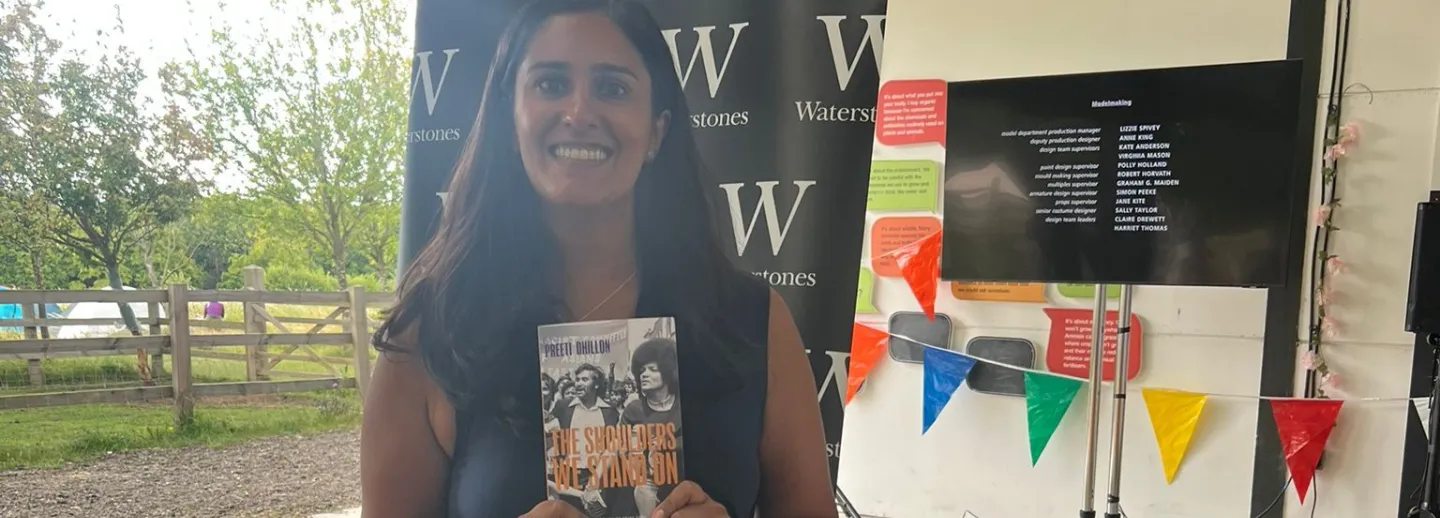Loading...

Blog Post
Preeti Dhillon's new book The Shoulders We Stand On tells the story of how Black and Brown people fought for change in the United Kingdom. Here she tells the story of how she was inspired to write it at WOW London in 2019.
"I can pinpoint the exact moment that the trajectory of my life was changed forever. If that sounds dramatic, it’s meant to be; without this event I wouldn’t have become an author. For this, I have WOW and Angela Davis to thank.
I went to see Angela Davis speak at the Southbank in London for the WOW Festival for International Women’s Day 2019. I went alone, having bought my ticket the instant ticket sales opened like it was Glastonbury. I didn’t want to wait for friends to respond if they wanted to come and risk the event being sold out.
It was a typically dreary late winter/early spring Friday evening but I didn’t care as I excitedly made my way to the Royal Festival Hall to see Davis. Seeing Davis speak was the closest an 'In conversation with' can come to a stadium concert. My nosebleed seat didn’t stop me from relishing every moment. The crowd was absolutely buzzing, Davis could barely get out a sentence without whooping and cheering drowning her out.
Nearing the end of the conversation, which had ranged from her early career, to her work on Palestine, Davis issued a cautionary word. She mentioned the trend in publishing of books about ‘great individuals you should know about’, and while acknowledging the great work they do in spreading the word about people not often studied in history, especially women and Black and Brown people (Davis also pointed out that she is featured in at least one of those books), she asked the audience to not be taken in by the cult of the individual. She reminded the audience that it is not simply individuals but movements that make all the difference, and books such as these can make us think otherwise, doing a disservice to activism and even buoying capitalism.
Davis mentioned groups and movements involved in US Civil Rights I had never heard of, like the Black female maids behind the Montgomery Bus Boycott, and it got me thinking that there must have been civil rights groups in the UK too. There was a long history of racism in the UK, and though I had never heard of any resistance movements there had to have been some pushback. Surely?
After the event, I did a few internet searches and library book reservations and soon learned about dozens of anti-racist and anti-capitalist campaigns and movements from the 1960s to 1980s. Not only were there ample examples, but there were so many led by Black and Brown people, men and women alike - all right here in the UK - including where I grew up in Southall in west London. I was a researcher in international development at the time but had studied history and so this was all fascinating to me.
I decided that I wanted to know everything. The hardship and heartache of life in the 1960s to 1980s in the UK, and more than that, the fight back. I wanted to know everything that happened in parts of London outside of Southall I never visited as they were deemed ‘too dangerous’. And outside of London: how did Black and Brown people live in Bristol, in Bradford and beyond? Did they experience racism and in what forms? How did they fight back? Did they fight at all?
The answers to these questions were so incredible they just had to be in a book. They evolved intomy debut book The Shoulders We Stand On: How Black and Brown people fought for change in the UK published by Dialogue Books in September 2023. The book tells the stories of ten remarkable movements, campaigns and organisations led by Black and Brown people in the 1960s to 1980s that fought against racism and capitalism, and impacted the way we live in the UK. It looks at the fight in all areas of life including education, work, healthcare, housing, and on the streets. It helps us understand the society that we live in today, and inspires us to continue fighting for change where it’s needed.
As I sit here four years later with my book publication around the corner, I still have my ticket from the event as a memento of that life-changing evening."